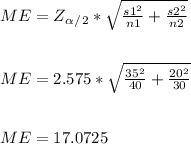
Mathematics, 06.05.2020 02:14 faith365
USA Today reports that the average expenditure on Valentine’s Day is $100.89. Do male and female consumers differ in the amounts they spend? The average expenditure in a sample survey of 40 male consumers was $135.67, and the average expenditure in a sample survey of 30 female consumers was $68.64. Based on past surveys, the standard deviation for male consumers is assumed to be $35, and the standard deviation for female consumers is assumed to be $20. 1. What is the point estimate of the difference between the population mean expenditure for males and the population mean expenditure for females?
2. At 99% confidence, what is the margin of error?
3. Develop a 99% confidence interval for the difference between the two population means.

Answers: 2


Other questions on the subject: Mathematics

Mathematics, 21.06.2019 22:30, azainababbas
Which statement shows that 6.24 is a rational number? a. 6.24 = 6.242424 b. 6.24 = 6.24 c. 6.24 = 68⁄33 d. 6.24 = 66⁄25
Answers: 1

Mathematics, 22.06.2019 00:30, luis83113
Afarm is to be built in the shape of quadrilateral abcd, as shown below. all four sides are equal. a rhombus abcd is shown with diagonal ac equal to 15.5 feet and diagonal bd equal to 13.2 feet. what is the area of the farm? pleas only pick from the 4 below 62 square feet 52.8 square feet 57.4 square feet 102.3 square feet
Answers: 2

Mathematics, 22.06.2019 02:00, darianhaynes
Study published in the journal of personality and individual differences found that adults with adhd displayed more creative achievement than those who didn't have the disorder. "for the same reason that adhd might create problems, like distraction, it can also allow an openness to new ideas," says holly white, assistant professor of cognitive psychology. "not being completely focused on a task lets the mind make associations that might not have happened otherwise." white and priti shah at the university of michigan gave 60 college students – half of them with adhd – a series of tests measuring creativity across 10 domains. the adhd group scored higher across the board. the adhd group showed more of a preference for brainstorming and generating ideas than the non-adhd group, which preferred refining and clarifying ideas. the adhd status of the participants was established by asking whether the individual had ever been clinically diagnosed with adhd/add. the tests of creativity were pencil-and-paper tasks administered in a laboratory setting. each of the ten scales was comprised of multiple questions, the scores on which were summed (e. g., writing creativity: "how many words can you make from the letters in the word 'psychology' invention creativity: "write down as many uses for a paper clip that you can think of.") this procedure does allow for a participant to be scored as showing no creativity under these conditions. a) state the research question in plain language (i wonder if is related to (1 point) b) state the null hypothesis (1 point) c) state the research hypothesis (1 point) d) is the research hypothesis directional or non-directional (1 point) e) name the predictor / independent variable f) give the operational definition of the predictor / independent variable g) evaluate the construct validity of the predictor / independent variable. (face, procedure, method-match) h) name the outcome / dependent variable i) give the operational definition of the outcome / dependent variable. j) evaluate the construct validity of the outcome / dependent variable. (face, procedure, method-match)
Answers: 1

Mathematics, 22.06.2019 03:00, ninigilford
Ben frank is an electrician who installs lighting fixtures. he charges (in dollars) his clients 15h+40f15h+40f where hh is the number of hours worked and ff is the number of fixtures installed. how much does ben frank charge when he works 77 hours and installs 99 fixtures?
Answers: 1
You know the right answer?
USA Today reports that the average expenditure on Valentine’s Day is $100.89. Do male and female con...
Questions in other subjects:

Mathematics, 11.02.2021 19:00


Mathematics, 11.02.2021 19:00






Mathematics, 11.02.2021 19:00

Mathematics, 11.02.2021 19:00





